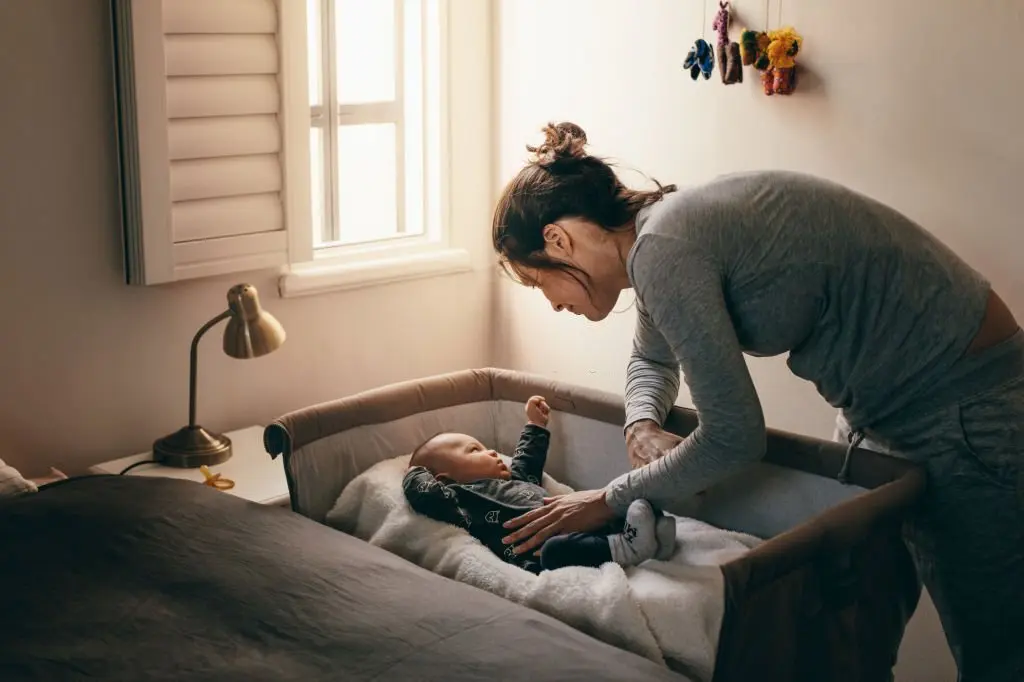How Long Should Baby Sleep in Your Room: A Comprehensive Guide for Parents

Introduction to how long should baby sleep in your room
Welcoming a baby into your home is an exciting, albeit sometimes confusing, period. One of the burning questions that many parents grapple with is: how long should baby sleep in your room?
According to the American Academy of Pediatrics (AAP), the ideal duration for room-sharing with an infant is between the first 6 months to a year of life.
This recommendation is not just a random proposition, but is backed by numerous studies showing that it helps reduce the risk of Sudden Infant Death Syndrome (SIDS) and other sleep-related infant deaths.
Why room-sharing is recommended

Sharing a room with your newborn comes with a host of benefits, making it an appealing option for many parents. Firstly, it offers unparalleled convenience for breastfeeding mothers.
Being within arm’s reach of your little one means that you can attend to their nutritional needs promptly, without the need to traverse your home at odd hours of the night. This close proximity can also ease the process of nursing, as babies who are room-sharing are often reported to nurse more frequently.
Secondly, room-sharing enables enhanced monitoring of the baby. This close observation allows parents to immediately notice any issues, be it a simple diaper change or a more serious health concern. Parents can promptly respond to any signs of distress, ensuring that the baby is safe and comfortable.
Lastly, sharing a room can foster early parent-infant bonding. This bonding is not only emotionally fulfilling for parents, but also beneficial for the baby’s emotional development. The presence of a parent can provide a sense of security for the baby, which can help them to sleep more soundly and wake less frequently.
Risks associated with early transition to a separate room
While the idea of reclaiming your personal space may be enticing, transitioning your baby to a separate room too early might lead to certain risks. One of the major concerns is an increased risk of SIDS. Research has shown that infants who room-share with their parents for at least 6 months have a lower risk of SIDS compared to those who transition to a separate room earlier.
Moreover, babies who are moved to their own room too early may also experience more sleep disturbances. This can be due to a number of factors, including their adjustment to a new environment, the absence of familiar sounds and scents, and a greater sense of isolation.
Lastly, the early transition can potentially cause emotional distress for the baby. Separation from their primary caregivers during a period when they are still developing a sense of trust can trigger feelings of anxiety and insecurity, which may affect their sleep quality and overall well-being.
While there is no one-size-fits-all answer to the question of how long should baby sleep in your room, the recommended guideline of 6 months to a year offers a good starting point. It takes into account the physical, emotional, and developmental needs of the baby while also considering the practicalities for the parents.
The science of baby sleep
When thinking about how long should baby sleep in your room, it’s vital to understand the science behind baby sleep. After all, knowledge is power, and in this case, it could lead to better sleep for everyone!
Understanding baby sleep cycles
From the moment they are born, babies have different sleep cycles compared to adults. For starters, their sleep is divided into more periods across 24 hours, and each period comprises two stages: Rapid Eye Movement (REM) and non-REM sleep.
During the first few months, babies spend about 50% of their sleep time in the REM stage, which is significantly more than adults. This stage of sleep is characterized by faster and irregular breathing, increased heart rate, and eye movement under the eyelids. It’s the period of sleep when dreaming occurs and, for infants, it plays a critical role in their brain development.
Moreover, babies’ sleep cycles are shorter, lasting about 50-60 minutes, whereas adult sleep cycles typically last about 90 minutes. This is why babies wake up more frequently during the night. Understanding these sleep cycles can help parents establish realistic expectations and better manage night-time feedings or comfort sessions.
Sleep development milestones
As your baby grows, their sleep patterns change significantly. By 3 months of age, they begin to produce melatonin, a hormone that helps regulate sleep and wake cycles. This production often leads to longer stretches of sleep during the night, a milestone eagerly awaited by many sleep-deprived parents!
Between 4 to 6 months of age, babies start developing a more regular sleep-wake cycle. They gradually drop the number of daytime naps and begin sleeping more during the night. However, remember that each baby is unique, and reaching these milestones may vary significantly from one child to another.
By 6 months to a year, many babies are capable of sleeping through the night. However, night wakings can still occur due to growth spurts, teething, or separation anxiety.
These sleep development milestones play a significant role when deciding the right time for transitioning your baby to a separate room. It’s important to assess their readiness based on these milestones, but remember, you know your baby best.
Practical considerations for room-sharing
Beyond scientific insights and expert recommendations, there are several practical considerations to ponder when it comes to the question of how long should baby sleep in your room.
Space and comfort
Not every home comes with the luxury of ample space. When planning for room-sharing, evaluate whether your room can comfortably accommodate a safe baby sleep area. This space should fit a crib or a bassinet, away from any potential hazards such as window blinds, heaters, or power sockets.
Another aspect to consider is the level of disturbance in the room. Are you or your partner night owls or early risers? Do you have habits that might disturb the baby’s sleep, like watching television in bed or snoring? It’s important to consider the impact of these factors on your baby’s (and your own) sleep quality.
Night-time feedings and comforting

The proximity of your baby when room-sharing makes night-time feedings less disruptive. It’s far easier to nurse or prepare a bottle when your baby is right next to you. This convenience can lead to less overall wake time, helping both parents and baby to get back to sleep quicker.
Similarly, when your baby needs comforting, whether due to a nightmare, teething pains, or just needing to feel your touch, being in the same room allows for immediate soothing. This can result in less prolonged crying and a quicker return to sleep for all parties involved.
Transitioning to a separate room
As your baby grows, you may decide to transition them to their own room. This can be a big change for both you and your baby, so it’s important to take your time and make the transition gradually. Here are some tips to help make the move as smooth as possible:
- Start with naps: Begin by having your baby take their naps in their own room. This will help them get used to the space and feel comfortable sleeping there.
- Establish a bedtime routine: A consistent bedtime routine can help your baby feel calm and relaxed before sleep. Include activities like a bath, reading a book, or singing a lullaby.
- Use a baby monitor: A baby monitor can give you peace of mind while your baby is sleeping in another room. Make sure the monitor is set up correctly and always within reach.
- Make the room safe: Before your baby sleeps in their own room, make sure the room is free from hazards. Check for loose wires, sharp corners, and any other potential dangers.
- Be prepared for nighttime wake-ups: Your baby may wake up more frequently during the transition period. Be prepared to offer comfort and reassurance as needed.
Remember, transitioning to a separate room is a big milestone and every baby is different. Be patient and take it one step at a time.
When to transition
The decision to transition your baby to a separate room should primarily be based on their age and developmental readiness. Following the AAP’s guidelines, the transition should ideally occur between 6 months to a year. However, every baby is unique, and some may be ready for their own room earlier or later than this suggested timeframe.
In addition to age, other developmental factors to consider are their sleeping patterns and self-soothing abilities. If your baby is sleeping for longer stretches at night and can self-soothe upon waking, they may be ready for the transition. Furthermore, if your presence in the room seems to be more of a distraction than a comfort to them, it could be a sign that they’re ready for their own space.
How to transition
Making the transition to a separate room can be a process. It’s crucial to ensure that the change is gradual and not abrupt, as the latter can lead to increased anxiety and sleep disturbances for your baby.
Start by letting your baby take daytime naps in their new room. This will allow them to get accustomed to the new surroundings and understand that it’s a safe place for them to sleep. Gradually increase the amount of time they spend in their room, and once they are comfortable, start putting them to bed there at night.
Make sure to maintain the same sleep routines that you had when room-sharing. If you usually read them a bedtime story or sing a lullaby, continue doing so in their new room. This continuity can help them feel more comfortable with the change.
Also, invest time in making their room a soothing and sleep-friendly environment. Use a nightlight if they are afraid of the dark, and consider using a white noise machine to help drown out any unsettling noises.
Remember, patience is key during this transition. There might be a few hiccups along the way, but with consistency and reassurance, your baby will eventually feel comfortable in their new room.
Conclusion on how long should baby sleep in your room
the duration for which a baby should sleep in your room is an important consideration for new parents. Room-sharing provides numerous benefits, including increased bonding, convenient nighttime care, and reduced SIDS risk. Following the recommendations of the American Academy of Pediatrics, it is generally advised to have your baby sleep in your room for at least the first six months and ideally up to one year.
However, it’s essential to remember that every family’s circumstances are unique, and what works best for one may not work for another. Trust your instincts as a parent and consider factors such as your baby’s sleep patterns, your own comfort, and any specific needs or challenges you may have.
Addressing common concerns, room-sharing does not spoil your baby. It fosters a sense of security and attachment, which are vital for their emotional development. While it may require adjustments to your sleep routine, with proper planning, you can establish a sleep schedule that accommodates both you and your baby’s needs.
If you decide to transition your baby to their own room, take it gradually and make the environment familiar and comforting. Remember, every child is different, and the timing of this transition may vary. Be patient and provide support as your baby adjusts to the change.
In the end, the most important aspect is ensuring a safe and nurturing sleep environment for your baby. Whether you choose to have them sleep in your room for six months, a year, or longer, prioritize their well-being and create a space that promotes healthy sleep habits.
Remember, as a parent, you know your baby best. Trust your instincts, seek guidance from healthcare professionals, and create a sleep routine that suits your family’s needs. With love, care, and attention, you can provide your little one with a safe and comfortable sleep environment, setting them up for healthy growth and development.
Also Read:
- When To Move Baby To Crib : A Comprehensive Guide
- How to Get a Baby to Sleep in Crib: Your Ultimate Guide
- When Should Baby Sleep In Crib In Their Own Room
- 20 Creative Small Nursery Ideas When You’re Tight On Space
- Bedroom Nursery Tips: How to Set up a Nursery In Your Bedroom
FAQs on how long should baby sleep in your room
What does the AAP recommend about room-sharing?
The American Academy of Pediatrics recommends that babies should share a room with parents for at least 6 months, but ideally up to a year. This is to reduce the risk of SIDS and other sleep-related infant deaths.
Why is room-sharing beneficial for babies and parents?
Room-sharing benefits include convenience for breastfeeding, easier monitoring of the baby, and increased opportunities for bonding. It can also help parents respond quicker to their baby’s needs and offer immediate comfort.
What are some risks of transitioning to a separate room too early?
Risks include an increased risk of SIDS, potential sleep disturbances due to unfamiliar surroundings, and possible emotional distress for the baby.
When should I move my baby to their own room?
Typically, the transition should occur between 6 months to a year, but it largely depends on the baby’s readiness and individual development milestones.
How can I ease the transition to a separate room?
Gradually introduce your baby to their new room by starting with daytime naps. Keep sleep routines consistent, and make the new room a soothing and sleep-friendly environment.
Will Room-Sharing Spoil My Baby?
It’s natural to worry about spoiling your baby by having them sleep in your room. However, rest assured that room-sharing does not lead to spoiled behavior. Infants thrive on love, attention, and nurturing, and having them close during sleep is part of creating a secure attachment.
Can Room-Sharing Interfere with My Sleep?
While room-sharing may require some adjustments to your sleep routine, it does not have to disrupt your rest entirely. With proper planning and organization, you can establish a sleep routine that accommodates both you and your baby’s needs.
What If My Baby Has Trouble Sleeping Alone?
Transitioning your baby to sleep in their own room can sometimes be challenging. To ease the process, gradually introduce your baby to their own sleeping space by incorporating familiar objects, such as a favorite blanket or stuffed animal.
